#Afrikaner Nationalism
Text
Swart Gevaar … Wit Gevaar
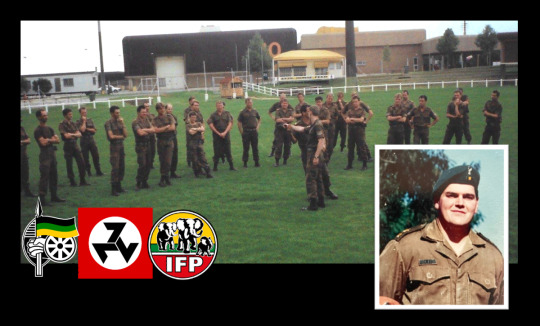
View On WordPress
#African National Congress#Afrikaner Nationalism#Afrikaner Weerstandsbeweging#ANC#BMATT#CODESA#Conscription#Drill Hall Johannesburg#End Conscription Campaign#FW de Klerk#Inkata Freedom Party#National Party#National Service#Nelson Mandela#Post Traumatic Stress Disorder#PTSD#SAAF#SADF#SANDF#Shell House#South African Army#South African Defence Force#South African National Defence Force#The National Party#VMS System#Witwatersrand Command
0 notes
Text
There are those who are called to serve the community, there are those who are called to lead the nation, there are those who are called to support their families; yet all are equally of value and of service. We need to get back to this. We can't go it alone. We have to open ourselves up to community. We need to reconnect to each other.
64 notes
·
View notes
Text
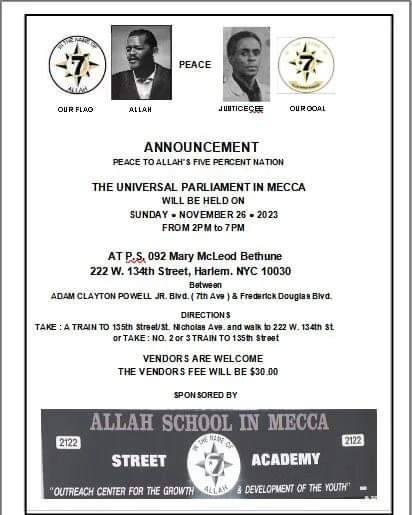
#nation of gods and earths#supreme mathematics#five percent nation#allah school in mecca#hip hop#5% nation of gods and earths#black women#father allah#black men#latino#african american#new afrikan#poetry#spirituality#Bipoc#brooklyn#Harlem#spanish harlem#vegan#underground hip hop#rappers
11 notes
·
View notes
Text

Given that I was about 7½ at the time, it's really a wonder that I didn't grow up with a fetishistic affinity for black guys. I mean, I already had access to the "grown-up" section of the public library, but I can see how that might have happened.
And it's not like they were putting cocks-out anglos on mainstream publications, that year.
I also see how this can be deemed as "purely anthropological," but they looked OK, regardless. I still didn't really HAVE a sexuality, yet.
Now, they just ban everything.
#national geographic#lgbtqia#baby gay#afrikan beauty#dicks out#magazine cover#favorite periodical#human sexuality#book banning
2 notes
·
View notes
Text
Behind Georgia’s Authoritarian Crackdown on ‘Stop Cop City’ Protests - The Appeal
At least 42 people have been charged with “domestic terrorism” under the state’s wide-ranging statute. Legal experts are calling it a “sloppy” and unprecedented attack on constitutional rights to free speech and protest.
— Read on theappeal.org/stop-cop-city-protests-domestic-terrorism-georgia/
View On WordPress
#African/Black experience#Afrikan#Anti-Blackness#apartheid#Atlanta Georgia#corruption#incarceration nation#lynching#militarized police#Military Industrial Complex#murder#music#police brutality#police terrorism#political assassination#Political Prisoners#protest#racial profiling#racism#Stop Cop City#terrorism#violence#War on Afrikans
3 notes
·
View notes
Text
This article is from 2022, but it came up in the context of Palestine:
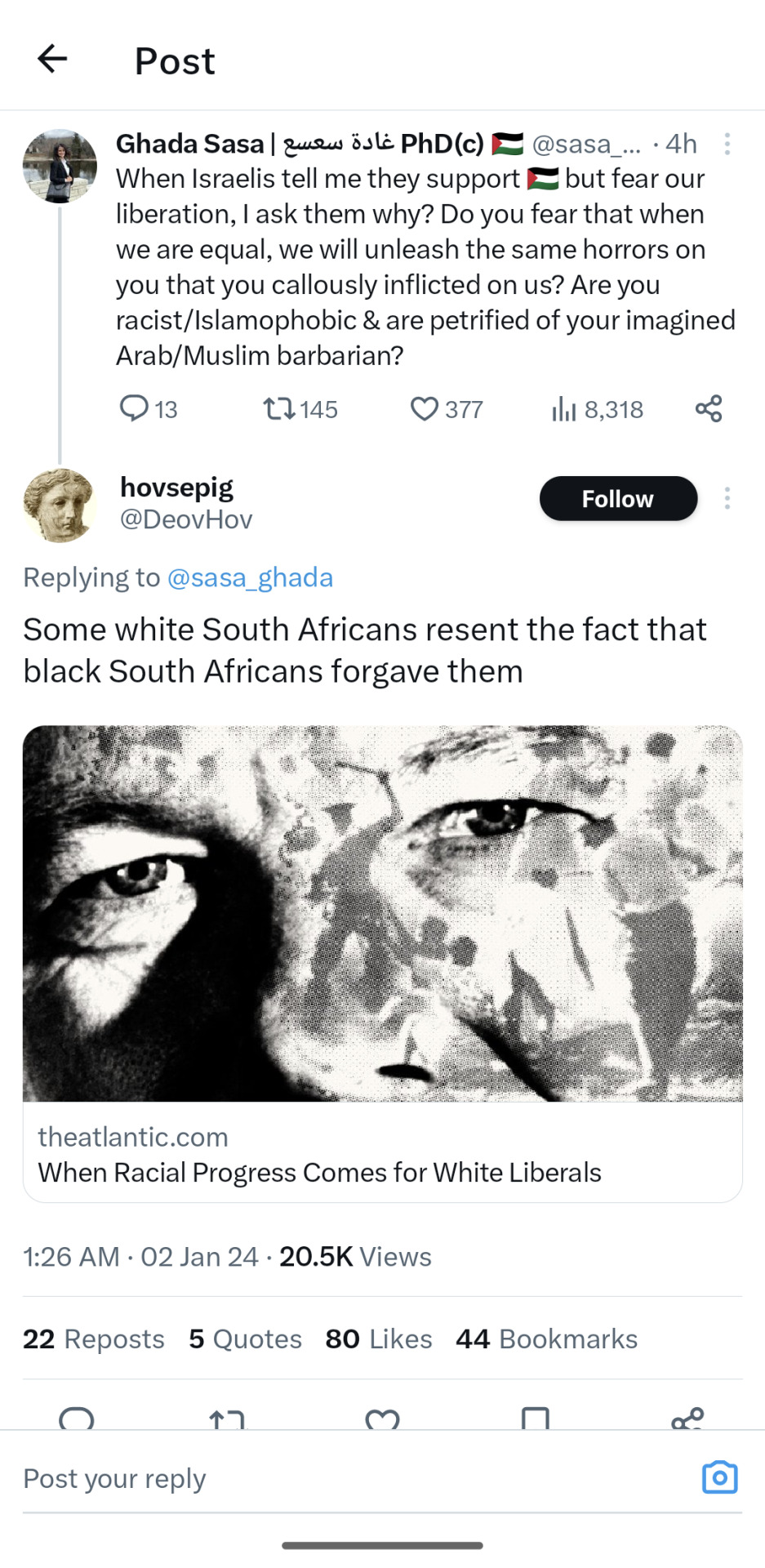
Here are some striking passages, relevant to all colonial aftermaths but certainly also to the forms we see Zionist reaction taking at the moment:
Over the decade I lived in South Africa, I became fascinated by this white minority [i.e. the whole white population post-apartheid as a minority in the country], particularly its members who considered themselves progressive. They reminded me of my liberal peers in America, who had an apparently self-assured enthusiasm about the coming of a so-called majority-minority nation. As with white South Africans who had celebrated the end of apartheid, their enthusiasm often belied, just beneath the surface, a striking degree of fear, bewilderment, disillusionment, and dread.
[...]
Yet these progressives’ response to the end of apartheid was ambivalent. Contemplating South Africa after apartheid, an Economist correspondent observed that “the lives of many whites exude sadness.” The phenomenon perplexed him. In so many ways, white life remained more or less untouched, or had even improved. Despite apartheid’s horrors—and the regime’s violence against those who worked to dismantle it—the ANC encouraged an attitude of forgiveness. It left statues of Afrikaner heroes standing and helped institute the Truth and Reconciliation Commission, which granted amnesty to some perpetrators of apartheid-era political crimes.
But as time wore on, even wealthy white South Africans began to radiate a degree of fear and frustration that did not match any simple economic analysis of their situation. A startling number of formerly anti-apartheid white people began to voice bitter criticisms of post-apartheid society. An Afrikaner poet who did prison time under apartheid for aiding the Black-liberation cause wrote an essay denouncing the new Black-led country as “a sewer of betrayed expectations and thievery, fear and unbridled greed.”
What accounted for this disillusionment? Many white South Africans told me that Black forgiveness felt like a slap on the face. By not acting toward you as you acted toward us, we’re showing you up, white South Africans seemed to hear. You’ll owe us a debt of gratitude forever.
The article goes on to discuss:
"Mau Mau anxiety," or the fear among whites of violent repercussions, and how this shows up in reported vs confirmed crime stats - possibly to the point of false memories of home invasion
A sense of irrelevance and alienation among this white population, leading to another anxiety: "do we still belong here?"
The sublimation of this anxiety into self-identification as a marginalized minority group, featuring such incredible statements as "I wanted to fight for Afrikaners, but I came to think of myself as a ‘liberal internationalist,’ not a white racist...I found such inspiration from the struggles of the Catalonians and the Basques. Even Tibet" and "[Martin Luther] King [Jr.] also fought for a people without much political representation … That’s why I consider him one of my most important forebears and heroes,” from a self-declared liberal environmentalist who also thinks Afrikaaners should take back government control because they are "naturally good" at governance
Some discussion of the dynamics underlying these reactions, particularly the fact that "admitting past sins seem[ed] to become harder even as they receded into history," and US parallels
And finally, in closing:
The Afrikaner journalist Rian Malan, who opposed apartheid, has written that, by most measures, its aftermath went better than almost any white person could have imagined. But, as with most white progressives, his experience of post-1994 South Africa has been complicated. [...]
He just couldn’t forgive Black people for forgiving him. Paradoxically, being left undisturbed served as an ever-present reminder of his guilt, of how wrongly he had treated his maid and other Black people under apartheid. “The Bible was right about a thing or two,” he wrote. “It is infinitely worse to receive than to give, especially if … the gift is mercy.”
13K notes
·
View notes
Text
Some tangible Black queer history for you!
In case you needed any more proof that we've always been here - this amazing collection is courtesy of the Stonewall National Musuem and Archive!
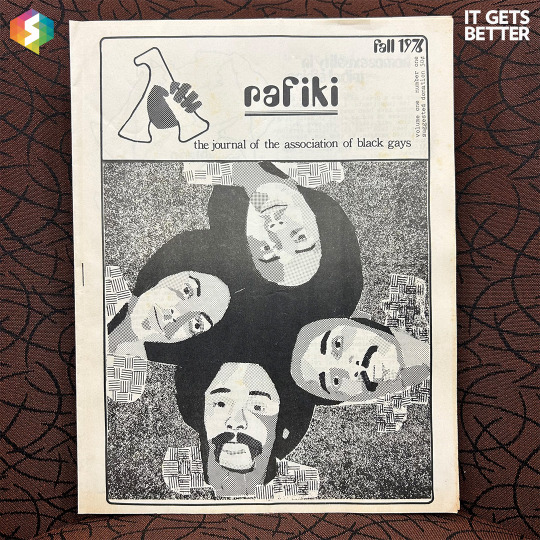
Rafiki: The Journal of the Association of Black Gays, Vol. 1 #1 (Fall 1976)
"Rafiki was a quarterly publication from the Association of Black Gays (ABG), a Los Angeles, California gay activist group that organized through education, political engagement, and grassroots activism to
improve the conditions for Los Angeles’s Black gays and lesbians.
According to the journal, the title Rafiki was chosen because it means “friend” in Swahili and “that’s what [ABG] hope to be for you.” This first issue includes an article on the history of ABG and the fact that Black gays and lesbians have been largely excluded from the political, social, and economic advances of the gay community.
Included in this issue are articles such as “Homosexuality in Tribal Africa” and “Disco Discontent” (an open letter to the owner of Studio One, Scott Forbes), as well as poetry by Steven Corbin and Frances Andrews, and book reviews. It even contains an ad for the famous Catch One Club owned by Jewel Williams, which is still
operating today!"
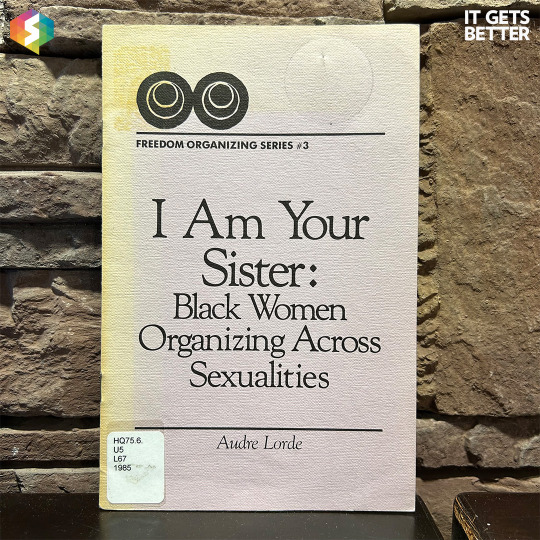
I Am Your Sister: Black Women Organizing Across Sexualities by Audre Lorde (Kitchen Table: Women of Color Press, 1985; from the Freedom Organizing Series)
You can read this one here!
"This small twelve-page publication derives from a speech Audre Lorde gave at the Women’s Center of Medgar Evers College in New York City regarding the exclusion of Lesbians in the feminist movement and how Lorde’s identity as both a Black woman and lesbian are inextricably linked.
Primarily, heterosexism and homophobia are major issues Lorde states are “two grave barriers to organizing among Black women.” Lorde ends the essay with the statement: “I am a Black Lesbian, and I am your sister.”
Her emphasis on the duality of this identity stems from a 1960s poster that said “He’s not black, he’s my brother!,” which Lorde states infuriated her because “it implied that the two were mutually
exclusive.”
Kitchen Table: Women of Color Press was founded by Barbara Smith—another Black Lesbian feminist—and Audre Lorde in 1980 to create a publishing apparatus for women of color who at the time did not have control over how they were published except through the white-dominated outlets."
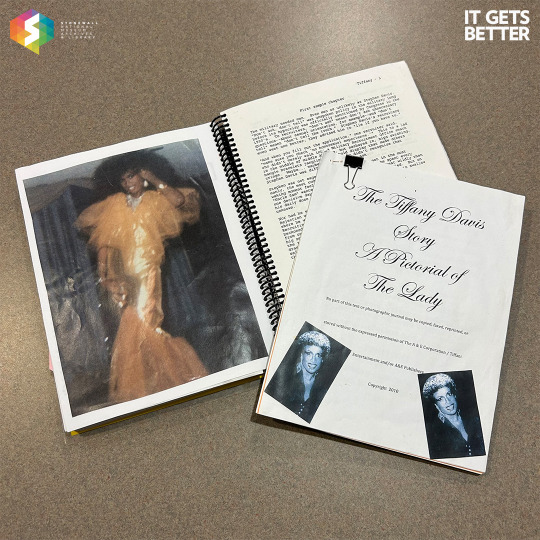
Flawless! The Life & Times of T.B.D.J. AKA Tiffani Inc. AKA Mrs. … (Manuscript) by Tiffany Bowerman (July 2007, A&E Publishers)
This autobiographical manuscript traces the life of Tiffany Bowerman aka Tiffany B.D. Johnson (b. 1959), who states that she “was the first African-American Transsexual to have state issued birth certificate reissued [1990]… was the first to legally marry three different active duty military men… [and] first… to found their own Christian Denomination… The Agape-Ecumenical Christian Denomination.”
Further, she states “I have tried to put together something striking and original[,] a journey from childhood to self aware adult. A life that was and is with all regrets included.”
This manuscript is a preliminary copy of a rough draft, and contains various memoirs, photographs, legal documents, and ephemera.
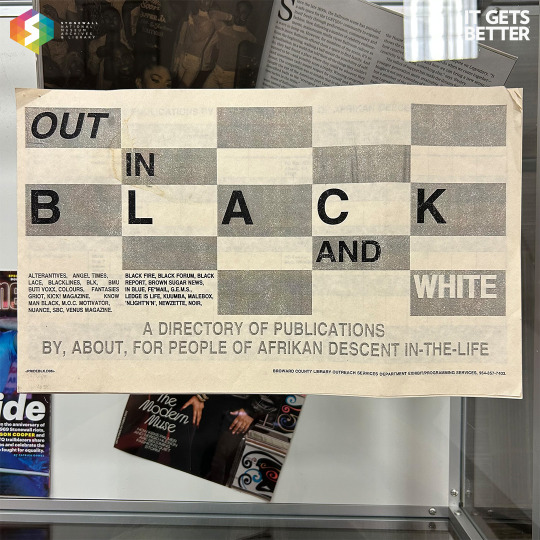
Out in Black and White: A Directory of Publications By, About, For People of Afrikan Descent In-The-Life by the Broward County Library Outreach Services Department Exhibit/Programming Services with direction by Eric Jon Rawlins (January, 1996)
Out in Black and White is a directory of various serial publications (magazines, newsletters, journals, etc.) throughout the United States that are focused on the Black LGBTQ experience. According to the directory, “[t]his project was inspired by the atmosphere of strength, oneness and productivity created by the Million Man March [on October 16,] 1995.”
The Million Man March was a political demonstration that took place at the National Mall in Washington, D.C. with the purpose of encouraging involvement in the improvement of the conditions of African Americans. Eric Jon Rawlins was a Broward County, Florida librarian who at one time was also the second vice president of the NAACP Fort Lauderdale branch in the late 1980s.
Currently, the Eric Jon Rawlins Collection consisting of personal and professional papers, as well as his 6,000 vinyl record album collection, are housed at the African American Research Library and Cultural Center Special Collections in Broward County, FL.
#it gets better#black history month#bhm#black trans lives matter#lgbtqia#queer history#lgbtq history#black history#queer archive#queer lit#studyblr
106 notes
·
View notes
Text
No Zionist has yet come up with a satisfactory explanation for how anyone who converts to Judaism, with no record of any ancestry in the Levant—someone like former US President Donald Trump’s daughter Ivanka, who embraced the religion shortly before marrying Jared Kushner, or the white Afrikaners converting to Judaism to flee post-apartheid South Africa and move to Jewish-only colonies in the West Bank—would be “returning” to Israel. Palestinian refugees whose families can document multigenerational ties to the land, on the other hand, are considered outside conquerors since, according to Zionist redwashing, being Arab, they must have come from the Arabian Peninsula.
Nada Elia, Greater Than the Sum of Our Parts: Feminism, Inter/nationalism, and Palestine
102 notes
·
View notes
Text
Israel was openly critical of apartheid through the 1950s and 60s as it built alliances with post-colonial African governments. But most African states broke ties after the 1973 Yom Kippur war and the government in Jerusalem began to take a more benign view of the isolated regime in Pretoria. The relationship changed so profoundly that, in 1976, Israel invited the South African prime minister, John Vorster - a former Nazi sympathiser and a commander of the fascist Ossewabrandwag that sided with Hitler - to make a state visit.
Leaving unmentioned Vorster's wartime internment for supporting Germany, Israel's prime minister, Yitzhak Rabin, hailed the South African premier as a force for freedom and made no mention of Vorster's past as he toured the Jerusalem memorial to the six million Jews murdered by the Nazis. At a state banquet, Rabin toasted "the ideals shared by Israel and South Africa: the hopes for justice and peaceful coexistence". Both countries, he said, faced "foreign-inspired instability and recklessness".
Vorster, whose army was then overrunning Angola, told his hosts that South Africa and Israel were victims of the enemies of western civilisation. A few months later, the South African government's yearbook characterised the two countries as confronting a single problem: "Israel and South Africa have one thing above all else in common: they are both situated in a predominantly hostile world inhabited by dark peoples."
Vorster's visit laid the ground for a collaboration that transformed the Israel-South Africa axis into a leading weapons developer and a force in the international arms trade. [Alon Liel, former Israeli ambassador to Pretoria] who headed the Israeli foreign ministry's South Africa desk in the 80s, says that the Israeli security establishment came to believe that the Jewish state may not have survived without the relationship with the Afrikaners.
"We created the South African arms industry," says Liel. "They assisted us to develop all kinds of technology because they had a lot of money. When we were developing things together we usually gave the know-how and they gave the money. After 1976, there was a love affair between the security establishments of the two countries and their armies.
"We were involved in Angola as consultants to the [South African] army. You had Israeli officers there cooperating with the army. The link was very intimate."
Alongside the state-owned factories turning out materiel for South Africa was Kibbutz Beit Alfa, which developed a profitable industry selling anti-riot vehicles for use against protesters in the black townships.
—
By the 1980s, Israel and South Africa echoed each other in justifying the domination of other peoples. Both said that their own peoples faced annihilation from external forces - in South Africa by black African governments and communism; in Israel, by Arab states and Islam. But each eventually faced popular uprisings - Soweto in 1976, the Palestinian intifada in 1987 - that were internal, spontaneous and radically altered the nature of the conflicts.
"There are things we South Africans recognise in the Palestinian struggle for national self-determination and human rights," says [Ronnie Kasrils, former South African Intelligence Minister]. "The repressed are demonised as terrorists to justify ever-greater violations of their rights. We have the absurdity that the victims are blamed for the violence meted out against them. Both apartheid and Israel are prime examples of terrorist states blaming the victims."
There are important differences. Israel faced three wars of survival, and the armed struggle in South Africa never evolved to the murderous tactics or scale of killing adopted by Palestinian groups over recent years. But, from the 1980s, the overwhelming superiority of Israeli military power, the diminishing threat from its neighbours and the shift of the conflict to Palestinian streets eroded the sympathy that Israel once commanded abroad.
White South Africa and Israel painted themselves as enclaves of democratic civilisation on the front line in defending western values, yet both governments often demanded to be judged by the standards of the neighbours they claimed to be protecting the free world from.
"The whites [in South Africa] always saw their fate in a way related to the fate of the Israelis because the Israelis were a white minority surrounded by 200 million fanatic Muslims assisted by communism," says Liel. "Also, there was this analysis that said Israel is a civilised western island in the midst of these 200 million barbaric Arabs and it's the same as the Afrikaners; five million Afrikaners surrounded by hundreds of millions of blacks who are also assisted by communism."
When Israel finally began to back away from the apartheid regime as international pressure on the Afrikaner government grew, Liel says Israel's security establishment balked. "When we came to the crossroads in '86-'87, in which the foreign ministry said we have to switch from white to black, the security establishment said, 'You're crazy, it's suicidal.' They were saying we wouldn't have military and aviation industries unless we had had South Africa as our main client from the mid-1970s; they saved Israel. By the way, it's probably true," he says.
emphasis mine. this article is from 2006 and is a part of a two-part series investigating whether israel subjects palestinians to apartheid. the first part is here. since this article was published, amnesty international, human rights watch, and the united nations office of the high commissioner on human rights, among other organizations, have declared israel’s occupation of and blockade on palestine (the west bank and gaza strip, respectively) a form of apartheid.
#israel#south africa#apartheid#long post#going to post more highlights from this piece#it is absolutely worth a close read
90 notes
·
View notes
Text
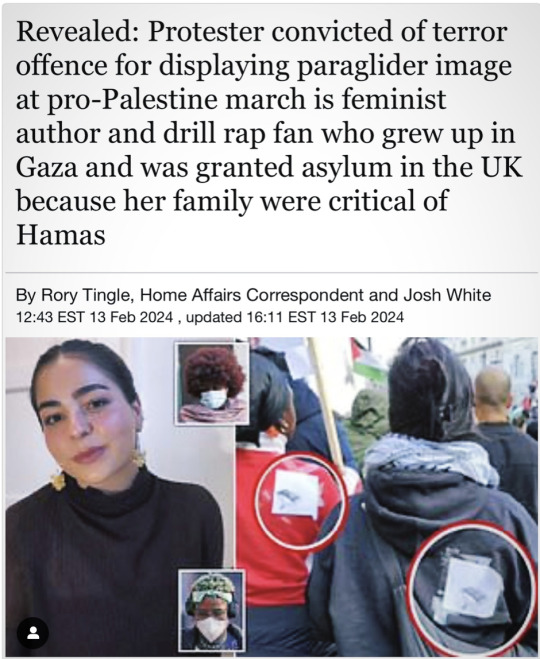
One of three women convicted of a terror offence for displaying images of paragliders at a pro-Palestine march is a Palestinian author and drill rap fan who was granted asylum in the UK because her family were critical of Hamas.
Heba Alhayek, 29, and her fellow protestor Pauline Ankunda, 26, attached stock images of paragliders to their backs on October 14 - just seven days after Hamas terrorists used paragliders to enter Israel before randomly slaughtering 1,200 people. Noimutu Olayinka Taiwo, 27, stuck one to the handle of a placard.
Alhayek, who grew up in Gaza before being granted asylum in the UK, is described in an online profile as an ‘author, creative and facilitator’ who studied an MA in Social Anthropology at SOAS and has a creative writing qualification.
The biography says her thinking is ‘rooted in anti-nation-state, decolonial, queer, Afrikan feminist thought’ and ‘navigates topics such as disposability, Global South solidarity movements, land justice, Palestinian drill music, and more.’
She, Ankunda and Taiwo were charged under the Terrorism Act with carrying or displaying an article to arouse reasonable suspicion that they are supporters of banned organisation Hamas,
After they were found guilty today following a two-day trial, the Crown Prosecution Service said displaying the images amounted to the ‘glorification of the actions’ of Hamas - despite a veteran Guardian journalist appearing to give evidence in their defence.
@antisemitismtoday2
42 notes
·
View notes
Text
I also think it’s interesting to think about the history of apartheid in an age where right-wing authoritarian movements are again on the march. Apartheid was a reactionary reassertion of a racial order that was beginning to come undone. Although capitalism was partly responsible for the decline of that order, Afrikaner nationalism and apartheid did not seek to replace capitalism with another system so much as make sure it worked properly for certain people. Apartheid, although was enforced with violence, was first instituted within the framework of liberal democracy, albeit with a severely limited franchise. It’s helpful to look at examples like South Africa as we broaden our understanding of far-right politics beyond the imaginary of “fascist coups.” With recent attempts to stigmatize and punish LGBT people as well as the frightening consequences of criminalizing abortion, it’s worthwhile to think about how even extreme repression is possible within a constitutional and legal order and may even require it for the regularity of its enforcement.
-John Ganz
111 notes
·
View notes
Text
Everyone's calling is their own. Everyone's gifts are expressed uniquely. Everyone is on assignment. Everyone's destiny is in their own hands yet intertwined with the collective.
#hoodoo#atrs#atr#black spirituality#cosmology#black indigenous#afrikan#alkebulan#first Nations#American Indian#native american#indigenous
28 notes
·
View notes
Text
youtube
Watch the American Climate Leadership Awards 2024 now: https://youtu.be/bWiW4Rp8vF0?feature=shared
The American Climate Leadership Awards 2024 broadcast recording is now available on ecoAmerica's YouTube channel for viewers to be inspired by active climate leaders. Watch to find out which finalist received the $50,000 grand prize! Hosted by Vanessa Hauc and featuring Bill McKibben and Katharine Hayhoe!
#ACLA24#ACLA24Leaders#youtube#youtube video#climate leaders#climate solutions#climate action#climate and environment#climate#climate change#climate and health#climate blog#climate justice#climate news#weather and climate#environmental news#environment#environmental awareness#environment and health#environmental#environmental issues#environmental justice#environment protection#environmental health#Youtube
16K notes
·
View notes
Text

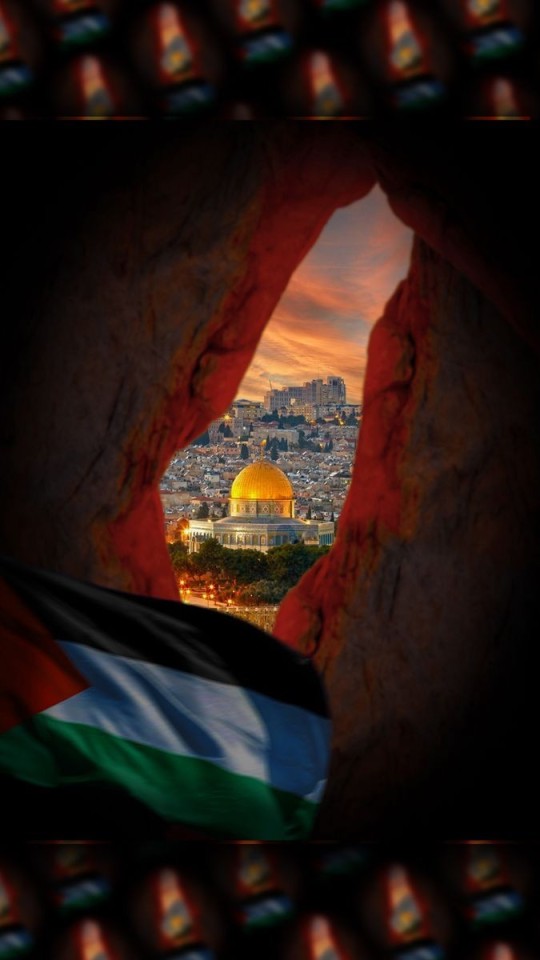
Peace
There is No Official statement nor stance from Allah School in Mecca/5% Nation of Gods ands Earths Headquaters gives No Official statement for the War or Conflict!
Condolences to people that lost their lives regardless to whom or what!
You need to ask individual Gods and Earths for their individual opinions on the subject.
Please consult history before speaking on the subject matter
Below are resources that are not mainstream sources. Please investigate further. Question all things, take nothing on face value!
youtube
https://mondoweiss.net/
youtube
#nation of gods and earths#supreme mathematics#five percent nation#allah school in mecca#hip hop#5% nation of gods and earths#black women#father allah#black people#black men#Youtube#palestine#Israel#israel palestine conflict#Black men#afro latina#latinos#hip hop rappers#african#afrikan centered#pan african#black nationlism#cultural nationalism#God#Allah#Yahweh
15 notes
·
View notes
Text
"The racist dimensions of international politics were manifest and explicitly challenged during the many months of intensive meetings at the Versailles Peace Conference of 1919 – at which was established the scaffolding of postwar colonial and imperial arrangements, including the British Mandate over Palestine.
White powers often described the struggle for 'world domination' as a 'race war' in the late nineteenth and early twentieth centuries. British imperialists distinguished between white and nonwhite (or 'coloured') peoples and assumed the former should rule and the latter should be ruled, defining 'Syrians' and Afghans, for example, as
'nonwhites.' ... Irrespective of anti-Semitism and the historically situated and to some degree malleable nature of whiteness as a social construct, Zionist settler-colonialism was understood by its advocates and their British and US allies to be a white socioeconomic project. Racism in Mandate Palestine expressed itself through civilizational discourse, extraction from the native population, the biopolitics of colonial categorizations and counting, and the systematic maldistribution of life, death, and wellbeing by investment priorities. Such maldistribution by priority is underplayed as a systemically racist dimension of settler-colonialism and colonialism in Palestine.
... The 'blueprint' for the Allied postwar geopolitical order, the League of Nations and its Mandate system, was authored by racist
war hero Jan Smuts, an Afrikaner from South Africa, at the behest of the British government. Published in December 1918 as The League of Nations: A Practical Suggestion, the document became a worldwide bestseller. Its stated purpose was to establish 'a means to prevent future wars.' Smuts’s use of the terms 'self-determination' and 'no annexation,' drawing on Woodrow Wilson’s Fourteen Points released in January 1918, offered thin ideological cover for European and US imperialist aims to control postwar geopolitics and resources. The 'peoples left behind' by the dissolution of the Russian, Austrian, Ottoman, and German empires, Smuts rationalized, were 'largely incapable or deficient in the power of self-government.' ... Smuts argued ... that the peoples of Palestine and Armenia were too 'heterogeneous' to be consulted regarding any future arrangement.
... By the 1919 Versailles Peace Conference certainly, British colonial politicians recognized, to borrow Helen Tilley's words, that egregiously racist policies threatened the stability of the colonial order by making 'governing far more difficult.' At the same time, policies of social equality or parity threatened to 'undermine' the (extractive and violent) logic of colonial relationships – the colonizer must be above the colonized. When such hierarchy was shaken, the 'prospects of [the colonized person’s] future usefulness [to the colonial state] is destroyed.' This helps explain why criticism of racial prejudice by some colonial elites 'was insufficient to undermine the social hierarchies of colonial states.'"
Frances S. Hasso, Buried in the Red Dirt: Race, Reproduction, and Death in Modern Palestine (2021)
21 notes
·
View notes
Text
RALLY 2 FREE MUMIA
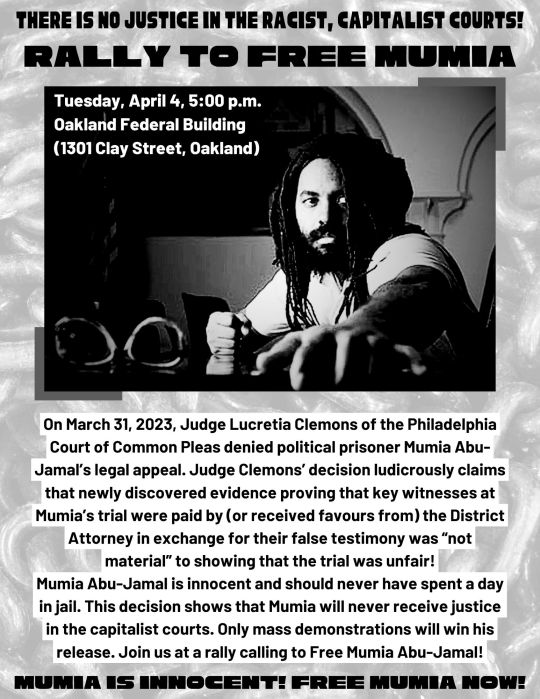
View On WordPress
#African/Black experience#Afrikan#Black Panther Party#BPP#Haiti#incarceration nation#Judge Lucretia Clemons#Mumia Abu Jamal#Oakland#Philadelphia#Political Prisoners#Prison Industrial Complex#prisoners#protest#racism#revolutionary#revolutionary leaders#terrorism#War on Afrikans
3 notes
·
View notes
Text
HipHop's 50th Anniversary: What 'Culture' are We talking about?
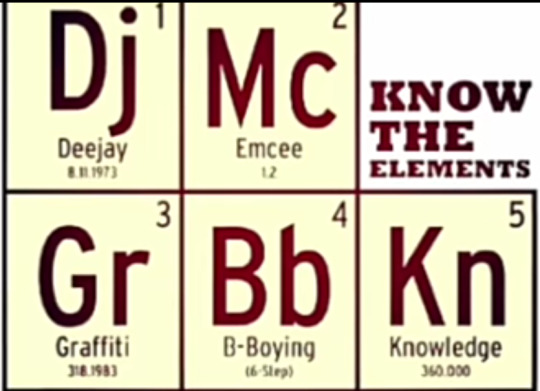
I was in Elementary School back on Aug. 11th 1973. My family left the West Bronx, but I spent a lot of time w/ my 'big cousins' in the Harlem River Houses. My cousin Mona babysat my brother & I, taking Us everywhere w/ her; including dates. I remember Mona taking Us to 'The Summer Of Soul Concert' in Harlem, & I remember going to a few of those Park Jams in Bronxdale & in Soundview. I think We saw more of King Mario than Kool Herc & Coke La Rock. My oldest brother formally introduced me to HipHop in the Spring of 1977. I remember coming home from School to find his Crew set up in Our Dining Room.
I got my 1st look from the 'Other Side of The Rope', & I was hooked! I wasn't a Rapper (yet), or a Break Dancer, but I had an ear for music. Like a lot of Old School Deejays (& under My brother's tutelage) I cut My teeth on Component Sets & BSR Turntables; rocking Line In switches b4 getting a [real] Mixer... I bought My own DJ Set in 1984 (B2s), & mastered my Craft as a Street DJ, & later in a few NYC Clubs. Most DJs are disciples of [Grand Master] Flash or [Grand Wizard] Theodore; I was more of a disciple of Jazzy Jay & Cut Master DC. We All have Our Unique Features, but EVERYONE went back to School when Jazzy Jeff introduced the 'Transformer Cut', back in 1986. Like a lot of DJs disenchanted w/ 'Gangsta Rap', I split time w/ HipHop's Twin Sister- House Music.
I say all of this, to qualify myself as a 'bonafide Shorty' of 1st Generation HipHop, & a full fledged Member of The New School Era. My point, is to say that 'In The Beginning', there was just The Culture. It didn't have a formal name- but it was being done ALL OVER NYC. I associate the '1520 Sedgwick Avenue' Story of HipHop w/ Afrika Bambaataa; he's The First Person that I remember telling this Story. Disco King Mario predated Kool Herc by years. Herc copied Mario's Style- down to his equipment! King Mario wasn't alone, Pete 'DJ' Jones & Frankie Crocker were dueling On The Radio (WWRL vs WBLS), while DJ Flowers, DJ Spotlight, DJ Smokey, DJ Hollywood, & a number of Club DJs were also mixing it up.
A major argument is whether Disco is connected to HipHop. The Cats up in The Bronx say HELL NO, while the rest of NYC says HELL YES! People need to understand that when We talk about 'Disco', we don't mean 'The Sound' or Studio 54; We mean 'The Disco Fever', 'Harlem World', 'Sugar Hill', & 'The Factory'. The DJs that spun @ these Clubs molded the format that HipHop DJs still follow Today. Kool Herc is credited w/ The 'Merry Go Round'- his mix of Break Beats, but he wasn't the only DJ mixing Breaks or James Brown songs. The Black Spades that were interviewed, speak on King Mario spinning 'Soul Power' & how they chanted 'Spade Power'- as early as 1971. This creates a schism between Bronxdale & Soundview.
Black Americans say HipHop started in Bronxdale, as late as 1971. West Indians- Jamaican- Americans in particular, say it started on Aug. 11th, 1973. Puerto Ricans [Nuyoricans/ Puerto Rocks] say it started between 1975 & 1977, when Afrika Bambaataa incorporated Latino Breakers into 'his' HipHop scene. While there is debate over When & Where in The Bronx it started, EVERYONE AGREES that HipHop was created to Stop Gang Violence. The Culture involves individual expression through Graffiti, B- Boy Style of Dress, & Dance, Spoken Word, & the ability to keep The Party going non-stop. The Original Gangs splintered into Crews that now 'battled' each other w/ Turntables & Mics, on the Dance floor, & w/ Spray Paint Cans (Bombing).
The vernacular of HipHop is based in The Nation Of Islam & The Nation of Gods & Earths, so it's big on Black Power, Black Excellence, & The Traditional Black Family. Both Organizations are Pan Afrikan in their Philosophy, so The Black Diaspora is represented. The same is true w/ The Zulu Nation. Before the rise of The Nation of Latin Kings & Queens, you would find Latino Zulu Kings & Queens- it was All Love! Afrika Bambaataa coined HipHop's 'Mission Statement' of: "Peace, Unity, Love, & Having Fun!", in a song w/ James Brown by the same Name. He also defined the existing '5 Elements' as the fundamentals of HipHop Culture. The Zulu Nation were the unofficial Ambassadors of HipHop; first taking it Downtown, & later taking it Globally... No One questioned Bambaataa's actions.
As We celebrate 50Yrs of HipHop, Afrika Bambaataa's Legacy is tarnished @ best. He has been Radio Silent, since allegations of Child Molestation rose against him 7Yrs ago. Every Move that Bambaataa made is being questioned- Was it a good move for HipHop to go Downtown to SoHo? Did it open the door to the current 'isms' that plague The Culture? It was a Black Specific art form, but it opened itself up to integration w/ Sexual Deviants, Drug Abusers, & White Record Executives. In retrospect, We can see what lured Bam Downtown. I'm curious- is the current manifestation of 'The Culture' Bambaataa's intended goal? It goes against his language, but it's in line w/ his actions.
In the wake of Afrika Bambaataa's 'Fall from Grace', people began questioning his narrative of HipHop. Original B- Boys are still walking The Streets, so it wasn't hard to fact check. DJ Phase has spoke on many Youtube videos under 'The Culture', where he breaks down the Foundation of what became HipHop. According to DJ Phase, HipHop was born on June 7th, 1971- in the Bronxdale Houses. He said that it wasn't organized; Mario simply set up on the grass & spun records. Later that Summer, in July- DJ Phase said that they were more organized w/ more sound & records, so THAT was when Brothers got serious about what they were doing. Disco King Mario did a series of Jams that culminated in the legendary 'Rosedale Park' Jam, that lit up The Bronx & inspired future pioneers.
There is a lot of controversy today concerning the Origins of HipHop. Jason Black, of 'The Black Authority' had the best comment on the subject: "Success has many Fathers, but Failure is an Orphan". As We question the running narrative of HipHop's birth, We also have to question WHO gets Credit for WHAT. No One questions the contributions of Jamaicans, Puerto Ricans, Cubans, Haitians, & Panamanians to The Culture, but the claims being made by Busta Rhymes, Pete Rock, Fat Joe, & John Leguizamo are disrespectful. Busta & Pete Rock assert that Jamaican Culture DIRECTLY INFLUENCED HipHop; Busta says 90%. He goes on to say that Kool Herc brought Jamaican 'Toasting' or 'Ranking' to the Bronx Youth. Fat Joe & John Leguizamo say Puerto Rico contributed 50% to The Culture... They ALL sound ridiculous.
In an effort to get ahead of King Mario predating Kool Herc, people have gone as far as saying that Disco King Mario is [half] Puerto Rican. When it was proven that Mario came from North Carolina, a Story came out that his family migrated to (Jim Crow) North Carolina back in 1912. Mario's Sister says they aren't Puerto Rican- They're North Carolinian & 'Country'... His Mother just liked the name Mario. This effort to remove Black Americans from a Black American genre is confusing. Making a contribution 'to', or an innovation 'of' something, doesn't make one 'The Originator' of it. DJ Phase made a point to elaborate on The Energy behind HipHop, & what inspired it. Our Family from The Diaspora mostly arrived after The Civil Rights Movement; They really don't know what AmeriKKKa was like before 1970.
Contrary to what Busta Rhymes, Pete Rock, or Fat Joe may say, HipHop begins w/ The Black Spades. As a boy in Harlem, I remember how revered The Black Spades were. They were respected, but I didn't understand why... Before The Black Spades, Blackfolk in The Bronx were being victimized by Whitefolk; 'Authur Avenue' Italians, in particular. According to The Black Spades, they couldn't go ANYWHERE w/o being attacked, so they organized & struck back. The Black Spades- essentially Black Teens, didn't just beat those Racists back; they opened up The Bronx for EVERY Black Person, giving them The Right of Autonomy. That Energy or Spirit of Revolution was celebrated in Song & Dance, & King Mario was The Conductor.
Kool Herc got to see King Mario & The Black Spades @ 'The Tunnel'. He heard the Breaks & saw how the Black Spades reacted... He heard 'Spade Power!'. Herc himself said that he analyzed what 'they were doing' & came up w/ The Merry Go Round. That, is an innovation. Herc never said that he introduced Toasting to those Baby Spades; in fact, Herc admitted trying to play Jamaican Music, but The Crowd didn't take to it. If Busta & Pete Rock were right, We should have some Reggae among familiar Beat Beats. All of these Cats talk about 'Culture', but they just sound ignorant. A 'Culture' is defined as: 'The sum total of Social Life'. If West Indian (i.e. Jamaican) and/or Latinx (i.e. Puerto Rican) Culture plays such a major role in HipHop, why did ALL of them adopt Black American Social Mores? Kool Herc admitted that he was clowned when he arrived in The Bronx; he thought Cowboy Boots were cool.
If we're going to run w/ the: 'Kool Herc is The Father of HipHop' Story, Coke La Rock should @ least be mentioned. He is credited w/ being The First Emcee. He was Herc's Partner. Busta & a literal Legion of Yardies want to coronate Herc as 'King of HipHop', but it was Coke La Rock that transformed 'Clive' into 'Kool Herc'. Clive DIDN'T KNOW THE CULTURE. Coke La Rock took him down to 125th Street, showed him what to buy, & how to sport it. Somehow, Coke La Rock was written out of the narrative. Again, Bambaataa started this. Another issue w/ Herc being hailed as 'The Father' of HipHop, is how easily he Bowed Down to U- Roy. Herc referred to him as 'his King'. Big Respect to U- Roy, I- Roy & ALL the Pioneers of Ska, Reggae, Lover's Rock, Dub Poetry, & Dancehall! That said, Black Americans BOW TO NO ONE! This is a Problem.
When We talk about Culture, HipHop embodies The Spirit of Revolution. Lay it out on the Black American Timeline, & it's a natural transition; from Work Songs, to Ragtime, to Jazz, to Rhythm & Blues, to Soul & Funk, to HipHop. It's the tireless spirit of Black Liberation in AmeriKKKa. Where does Jamaican or Puerto Rican 'Culture' fit in? They were 'Lovers, not Fighters'. We were Angry! What were they angry about? They were in America- Everything was 'Irie'! When DJ Phase was asked about this [Kool Herc] narrative, he cut to The Chase & said that this narrative gives Whitefolk a 'lane of claim' to Our Culture. It was Too Black, Too Strong, but it's been watered down. When We raise Our Heads, We will see that the people claiming ownership of Our Culture, are the same people representing Us in Government. They are the ones allowing Benign Neglect to continue. They also represent Us 'On Screen', but they rarely depict Us in a dignified manner; We're either Ghetto, or Cowards.
While We're on the subject of 'Culture', let's point out how the level of deviance & violence has risen w/ the number of Jamaican & Puerto Rican Rappers. Boogie Down Productions gets Full Credit for setting off the 9mm talk. Just- Ice's 'The Original Gangster of Hip Hop' was just plain Raw... Also, B- Girls didn't dress like or behave like Dancehall Girls; compare Shante, Lyte, & Latifah to Lil Kim, Nikki Minaj, & Cardi B. White Record Executives, like Lyor Cohen, have rerouted HipHop's 'messaging' to target Suburban Whitefolk eager to hear about 'Ghetto Life'. Today's Artists have been set up lovely by those who came before them, but I wonder if the New Jacks know The History? Do they know what it took for Us to maintain this? Cats had to show restraint, because Authorities were just waiting for Us to mess up. U can literally count the # of times U heard the N- Word b4 NWA... Do they know Themfolks tried to shut Us down in 1882; leading to the 'New School/ Hardcore Era' that started in 1983 w/ T- La Rock & Jazzy Jay, Run-DMC, & LL Cool J?
Truth be told, The Park Jams faded out by 1986- 1987. The Crack Wars began to make large gatherings dangerous. The 1st Crack Dealers (in My Hood) were The Dreads, who sold out of Weed Spots. The 'Rude Boys' weren't concerned w/ 'protocol', so things got Hot pretty quickly.... I understand that there is an effort to make HipHop EVERYONE'S genre, but it isn't; not anymore than Motown or Bebop. The World is welcome to enjoy HipHop, but make No Mistake- it's a Black American genre that just happens to be globally appreciated & adopted by many. That said, notions of people like Kool Herc, or Eminem being the 'Father' or 'King' diminish the effect that those 'Baby Spades' had on The Original Concept. We can appreciate their contributions, but HipHop Culture is bigger than them. It has a purpose, & it's NOT making Non Indigenous Blackfolk wealthy.
It was a youthful expression of Black Power & Creativity, but outside forces have turned it into a Golden Goose that only benefits White Record Execs & their Proxies. We treated Her like a Debutant, but She has been reduced to a Crack Whore that EVERYONE can get a piece of. Young Family has to go back to The Root. A Race War is looming, & i'm not sure that their music is up to task. Most of today's Artists are more concerned w/ their 30 pieces of silver, than The Culture it represents. Cats like Busta & Fat Joe aren't concerned, they're taking the money & running. Fat Joe wasn't even a Rapper back in The Day, he was a Stick up Kid; so he's always been about the 'Vic'. Big Pun on the other hand, was The Real Deal... HipHop has become symbolic of Black American Courtesy- We say: "have some", & Our 'guest' proceeds to help themselves to Everything. NO ONE is allowed to be more than a guest in the genres of Jamaican & Latinx Music, so why do they expect ownership in Black American Music?
When We talk about HipHop Culture, We need to remove All the noise in The Room. ANYONE making a claim to Our Culture should be Checked quickly. This 'Back to School Party' Story doesn't make sense! It's supposed to be inspirational, but it's narrated like just another Party. What's so special about it? What exactly motivated Herc's Sister to have this Party, several weeks before School started? How does this 'Party' spark a Movement? Compare it w/ HipHop being a Celebration of Black Youth in The Bronx [dramatically] winning their fight against White Supremacy & their Right of Autonomy- An UNAPOLOGETIC DISPLAY of Black Power. There was a REASON why NYPD left Mario & the Black Spades Deejays alone. When they were 'Jamming', The Black Spades weren't beating down White Racists... No disrespect, but Immigrant Family weren't Here, so they don't know what sparked this Movement.
The Original Concept of HipHop is rooted in stopping Gang Violence. It was a creative alternative to the death & destruction that We brought on each other. The current version of it is so far removed, it's almost unrecognizable. Today's manifestation is literally a Death Cult that offers little to no benefit to The Artist. White Executives seem convinced that it's only about Beats & Rhymes, but the Crap being presented is vulgar & cookie cutter; which defies HipHop's demand for Originality. After 50+Yrs, it's apparent that HipHop is best represented when it's Culturally connected to the Experience of Black American Life. EVERYONE ELSE is a House Guest & should behave accordingly.
#GatekeepingTheCulture#RebuttingTheSlanderers#OriginalConcept#BlackSpades#BabySpades#Bronxdale#DiscoKingMario#DJPhase#CokeLaRock#JHS123#RosedalePark#ZuluNation#5Percenters#LiberationMusic#KoolDJDee#GLIDisco3800#DJHollywood#TheMasterPlanBunch#DJSmokey#DJLucky#TheSmokeATrons#TheLuckATrons#IStillLoveHer#HetHeru#BBoy4Life
57 notes
·
View notes
Text
youtube
Watch the 2024 American Climate Leadership Awards for High School Students now: https://youtu.be/5C-bb9PoRLc
The recording is now available on ecoAmerica's YouTube channel for viewers to be inspired by student climate leaders! Join Aishah-Nyeta Brown & Jerome Foster II and be inspired by student climate leaders as we recognize the High School Student finalists. Watch now to find out which student received the $25,000 grand prize and top recognition!
#ACLA24#ACLA24HighSchoolStudents#youtube#youtube video#climate leaders#climate solutions#climate action#climate and environment#climate#climate change#climate and health#climate blog#climate justice#climate news#weather and climate#environmental news#environment#environmental awareness#environment and health#environmental#environmental issues#environmental education#environmental justice#environmental protection#environmental health#high school students#high school#youth#youth of america#school
16K notes
·
View notes